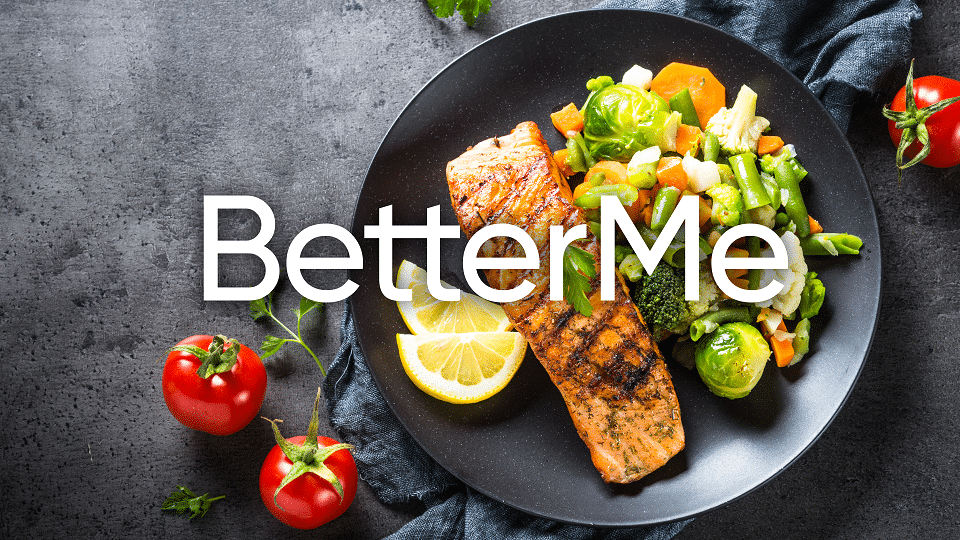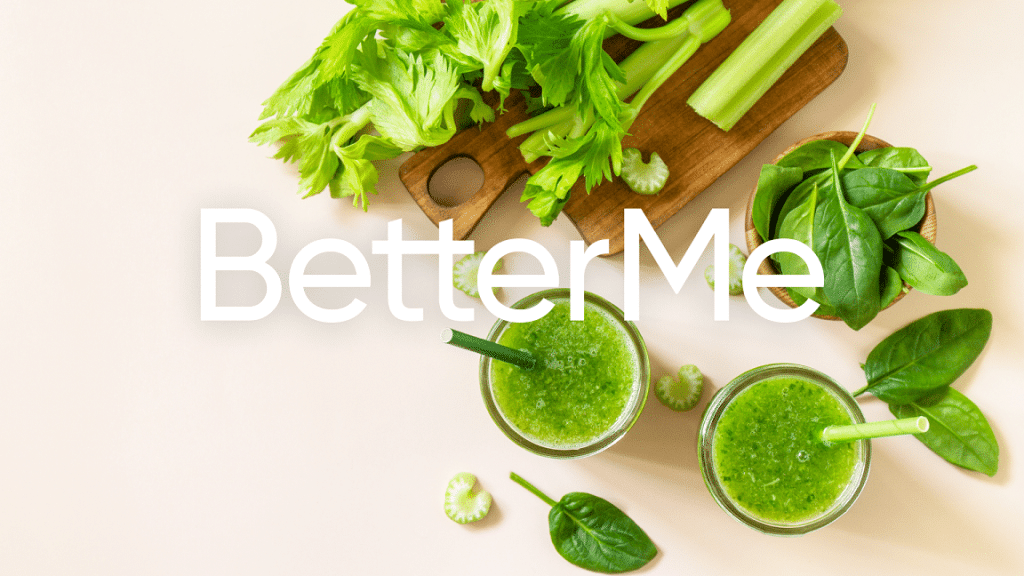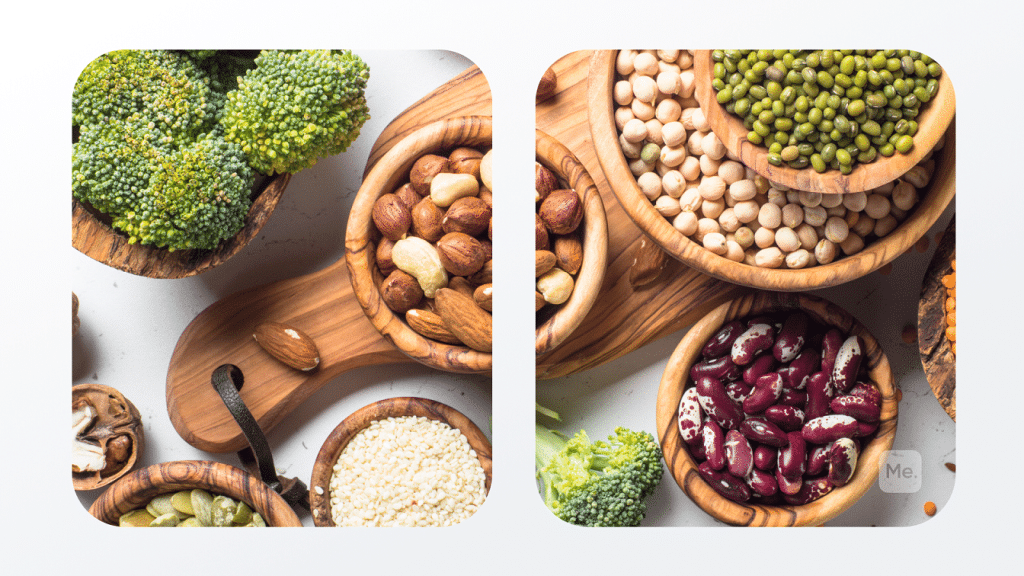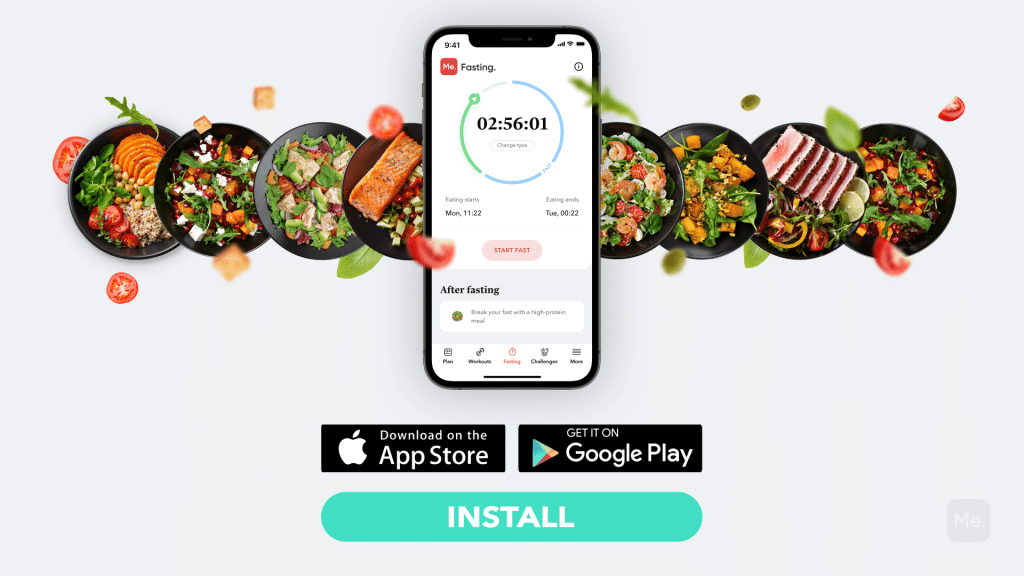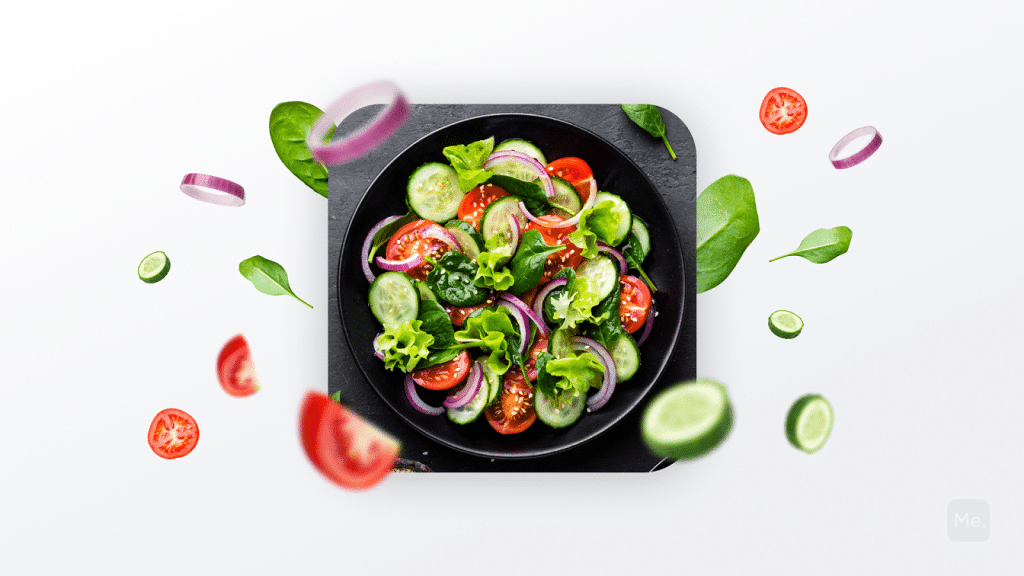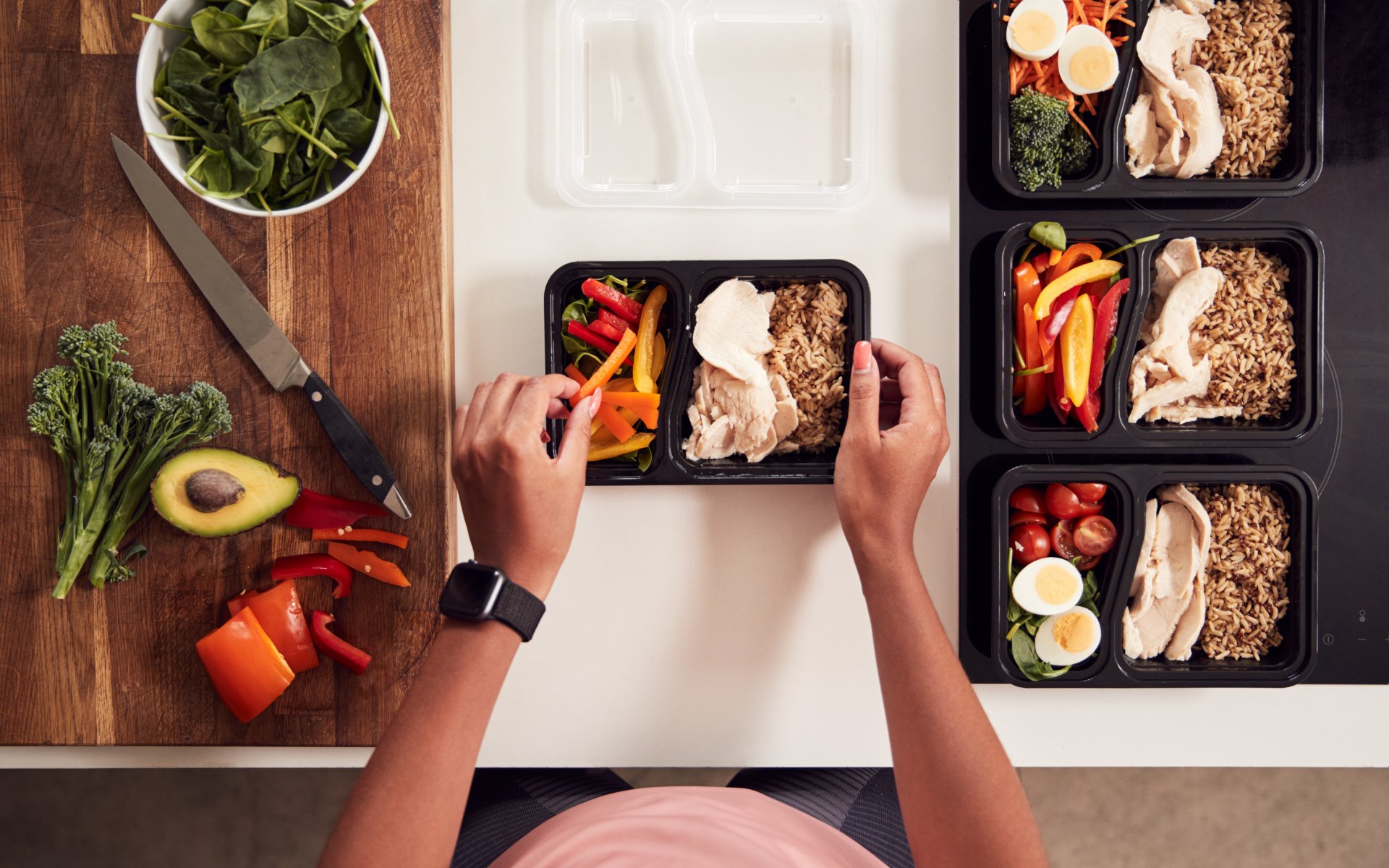PCOS is a condition that can be hard to live with. It manifests as irregular periods, hirsutism, infertility, and obesity to name a few. To try to alleviate these symptoms many people turn to diet.
It makes sense, right? If you have PCOS or are trying to get pregnant it’s natural to think that changing your diet could improve your symptoms. But what should you eat? There are so many conflicting opinions out there. You’ll be told to avoid carbs, eat more protein, have dairy but not milk, and “go organic”.
How do you separate fact from fiction? What should we eat and why? This article is going to look at some foods that you can eat to help your condition.
What Is PCOS And How Does It Affect Your Diet?
Polycystic Ovary Syndrome is a hormone imbalance that causes the ovaries to produce excess androgens (male hormones). The androgens are responsible for making the follicles on your ovaries grow in an “ovarian cyst” or “follicle cyst”. This condition can cause infertility and abnormal menstruation. It could also cause your body to produce excessive hair growth, which is why a lot of women with PCOS have very coarse and thick facial hair.
This condition affects 6-10% of reproductive-age women. It most often presents in adolescence or during the early adult years and gets worse as you age (it can start as early as 11 years old). It affects women about 4-5 times more than men.
How Do You Know If You Have PCOS?
The classic way to determine if you have PCOS is by finding out if you have excess male hormones in your blood. If you do, it is likely that you will suffer from other symptoms of the disease as well (5):
- Insulin resistance/diabetes (90%)
- Increased male pattern hair growth on the face, chest, and/or abdomen (80%)
- Acne or irregular periods (75%)
- Obesity (50-70% of patients)
How Do You Treat PCOS?
Treating PCOS is not an easy task. Diet alone cannot cure this disorder as over time while dieting the body becomes less sensitive to the insulin it produces, and the excess levels of male hormones can still cause problems.
PCOS is a lifelong condition that requires a lifetime commitment to finding the right medication or combination of medications for your individual needs.
Consult with your doctor before making any changes in your treatment regimen. If you are not currently being treated by an endocrinologist, please consult with your primary care physician. This is not one of those conditions that you can’t treat, it just takes time to find the right treatment and dose for you.
Read More: How To Lose Weight With PCOS: 5 Easy Dietary Tweaks
How Does Your Diet Affect PCOS?
It is difficult to give you a list of the best and worst foods for PCOS to which everyone would agree. In fact, that’s what makes this so interesting – it is all individual! Every single woman has a different combination and number of hormones which make her react differently to food and lifestyle (1). For example, some women may notice they have PCOS because they have an excess of androgens, while others may notice their cysts appearing after long periods of time where the only noticeable symptom was irregular cycles.
It is also important to remember that although foods can be a factor in causing or aggravating symptoms, PCOS is not caused by any one food. In fact, it is not even caused by genetics. Rather, there are a variety of factors that create the perfect storm for PCOS to appear in an individual woman’s life (4).
In general, women with PCOS tend to have higher insulin levels and lower insulin sensitivity than their peers without PCOS (3). This means that they are more likely to have symptoms like obesity, high blood pressure and strong cravings for carbohydrates.
The best foods to eat for PCOS are the ones that have a low glycemic index (GI) (1). The glycemic index is a rating system from 0 to 100 of how quickly a carbohydrate can be broken down into glucose and enter your bloodstream. It is based on the percentage of sugar in food as opposed to other nutrients (such as fat or protein) an item contains.
Maintaining a diet with this kind of food allows your body to maintain a normal level of blood sugar and keeps you feeling full for longer. Foods that have the highest GI are white bread, processed foods with added sugars, and white rice.
It is important to try different kinds of carbohydrates and find what works best for you in terms of how they affect your weight, health, and energy level. For example, some women will feel better having a lot of carbohydrates because it helps them maintain a healthy weight. Other women will feel better by avoiding these foods, as they cause cravings and more hair growth.
Best Foods For Women With PCOS
Here’s a best foods for PCOS list that contains the foods you should eat to manage the condition (3) (1):
Fatty Fish
Fatty fish, such as salmon, herring, cod, mackerel, and sardines contain omega-3 fats which help balance hormones by reducing inflammation throughout your body. Omega-3s are essential fats that your body cannot make on its own—you must get them from food. If you’re vegetarian or vegan, you can try taking a plant-based omega-3 in supplement form. You can also take flaxseed for this purpose.
Your other option is to eat it in its natural state: Fish. Wild-caught salmon, herring, mackerel and sardines are good sources of omega-3 fats. When you cook with fish, be mindful of the amount of oil or butter you add to your meal—this increases your calorie count and may cancel out some of the health benefits.
Stick to 2-3 servings of seafood a week—this is enough to reap all its heart-healthy rewards without raising mercury levels in your body.
Green Leafy Vegetables
Vegetables of any kind are great (broccoli, kale, spinach), but the green leaves contain more nutrients and they help to lower cholesterol levels in your blood which can reduce insulin resistance. Some women with PCOS have high cholesterol, so consider this when eating green leafy veggies.
Berries
Berries are low in sugar and high in fiber which helps to regulate insulin levels. Berries also contain polyphenols, which help to reduce inflammation throughout your body. I recommend staying away from processed sugars as much as possible.
BetterMe app will kick you out of the mental funk, shake off your extra weight, rid you of your energy-zapping habits, and help you sculpt the body of your dreams. Intrigued? Hurry up and change your life for the better!
Almonds And Other Nuts
Tree nuts are another great source of Omega 3’s, protein, and fiber which help reduce insulin levels in the blood. Many people with PCOS struggle with zinc deficiency, so nuts are actually a great food for this purpose as well.
Poultry
You can make a sandwich with turkey breast for a protein boost. Protein has been shown to reduce insulin resistance as well. Chicken is another great source of lean protein. For the best nutrition, choose free-range chicken that contains no hormones or antibiotics.
Whole Grains
Whole grains are rich in fiber which is great for regulating the insulin levels in your blood. They also contain essential vitamins and minerals that are necessary for energy production inside your cells.
Quinoa
Quinoa is a grain-like seed that contains all nine essential amino acids, which makes it high in protein. It can be used in place of rice or pasta to add fiber and protein to a meal. You can add this to soups in your crockpot.
Ezekiel Bread
It’s so easy for people with PCOS to turn their backs on carbs and junk food. However, you should still consider eating good grains whenever possible since they are rich in fiber, vitamins and minerals. Ezekiel bread has a lower glycemic index than most other kinds of breads because of the fact that it is made of sprouted grains and legumes, so it does not cause your blood sugar to spike as quickly.
Almond Butter
Almond butter is another great source of protein and healthy fat. Use raw almond butter with no added sugar or sodium because it contains more nutrients than regular almond butter.
How To Make Sure You Get Enough Protein, Fiber, And Calcium On A PCOS Diet
Protein, fiber, and calcium are important for women with PCOS. Getting enough of them will help:
- regulate the blood sugar levels;
- control hormones levels;
- prevent bone loss and osteoporosis.
Protein For Women With PCOS
The recommended daily protein intake for adult women is 0.8g/kg of weight (2). When on the diet plan it is important to consume high protein food to help reduce hunger and cravings.
Here are some good sources of protein on the PCOS diet:
- Eggs, cottage cheese, yogurt and milk (low/no fat);
- Fish such as salmon, tuna, mackerel, cod, and sardines;
- Lean beef (such as top sirloin or eye round), chicken breast, and turkey breast;
- Protein powder.
Read More: Fruits With Protein: Nature’s Desserts That Will Boost Your Daily Protein Intake
Fiber For Women With PCOS
Insufficient intake of fiber results in constipation and other related side effects like abdominal bloating, gas, pain, diarrhea, and irregular bowel movements.
According to the 2020 Dietary Guidelines for Americans, it is recommended that adult women need 21-25 grams of fiber a day (2). Good sources of fiber on the PCOS diet include:
- Vegetables such as broccoli, green beans, spinach, and Brussels sprouts;
- Fruits like blackberries, strawberries and blueberries;
- Cereals that have at least 5 grams of fiber per serving.
Calcium For Women With PCOS
Getting enough calcium is essential for preventing bone loss and osteoporosis. Osteoporosis increases the risk of fractures due to brittle bones which occur as you age.
The current recommendation for calcium intake for adult women is 1000 mg a day (2). Though this may vary depending on your age, weight, and lifestyle (like physical activity).
Good sources of calcium on the PCOS diet include:
- Milk (low/no fat) and dairy;
- Calcium fortified orange juice, soy milk and calcium supplements.
PCOS And Weight Gain
Does PCOS cause weight gain? No, but weight gain may be a symptom of PCOS.
The hypothalamus is the “master gland” that controls our appetite and metabolic rate (how fast we burn calories). The hormone leptin controls how much we eat. When you have more body fat, your brain senses these extra calories and lowers your appetite so that you don’t overeat (6).
The hypothalamus of women with PCOS doesn’t register the extra body fat in their bloodstream due to insulin resistance and they are more likely to store calories as fat because of this, thus, gaining weight (6).
How To Lose Weight With PCOS
It is important to understand that with PCOS you are not necessarily “resistant to weight loss.” (4) You should be able to lose weight by burning more calories than what you take in through eating.
You shouldn’t restrict calories, but make sure that you burn more than you eat and have an active lifestyle (exercising regularly).
If you are on the heavier side (BMI over 25), try eating less junk food and opt for the best foods for PCOS weight loss. A good diet should include lots of lean proteins (chicken breast, tuna fish, turkey, plant-based protein), some healthy starches (sweet potato, yams, brown rice), and unlimited veggies.
Use the following steps to lose belly fat:
- Eat lean proteins and complex carbs at every meal
- Exercise regularly
- Drink lots of water
- Avoid soda and other sugary drinks
- Cut out junk food
- Sleep well
In addition, you may take steps to control your insulin and glucose by getting tested for insulitis or prediabetes. Insulin resistance is one of the main causes of PCOS. If you have insulin resistance, then controlling your glucose and insulin is very important in treating PCOS.
Remember that gaining weight can be a symptom of PCOS just like insulin resistance and moodiness.
Lean and toned up body isn’t just a far-fetched fantasy. Check out the BetterMe app and watch it propel your weight loss journey into high gear!
Practical Tips On Eating Out With PCOS
Food is a big part of everyone’s life and it can be especially hard for women with PCOS. We have to eat healthily, but we also want to enjoy meals out with friends or family.
You might worry that you can’t eat in restaurants or attend social occasions due to the food choices available and because you may need to prepare alternative options for yourself. It is possible to enjoy eating out with PCOS, but there are a few things you can do to make this easier:
Remember The Basics
If you’re going out for dinner, remember your meal should start with soup and end with fruit or vegetables – this way you are making sure you get the nutrients your body needs!
Think About The Menu
Make a list of what’s available on the menu – if there is an option for carbs go for that; if not, lean meat or chicken might be a good alternative. The more you know what’s available on the menu, the easier it will be to make a choice.
Are there any appetizers that are low in carbs? If so, you can always order a serving of two as your starter and then share it with family or friends.
Is there anything on the main course options? Steak, chicken, fish etc. All of these make great main meals and they don’t usually have many carbs!
Is there a salad option? If so, try to stick to the green vegetables such as lettuce and cucumber. If you are not allowed dairy then ask for dressing on the side.
Dressings Are Important
Look out for sauces and dressings – they can often contain hidden carbs and may not be necessary to enjoy your meal. If you can choose your own salad dressing go for the ones that are low in carbs. There are many different brands on the market. Some spice mixes also taste great – try adding them to your salad for a tasty addition!
Consider Desserts Carefully
Can you order a sorbet or fruit as your dessert? If not, then ask if you can substitute it for ice cream with no carbs added. This is quite often available and most restaurants will do this gladly.
Think about the sauce they serve on desserts. Often there will be a selection of sauces such as vanilla, chocolate, fruit, or even caramel. Ask for the sauce on the side and then you can decide how much to use!
Another great tip is to ask your server if you can speak with the chef directly at the restaurant you are eating in. If they have five minutes to talk to someone, they will be willing to help and see what possible alternatives you can have.
Put Front House In The Loop For Birthdays And Special Occasions
We all need to celebrate our special occasions, and it’s best to be prepared by giving your server a bit of notice ahead of time. This way they’ll be able to let the kitchen know that your meal may not be exactly the same as everyone else’s. What’s more, it will also mean that your server can be on hand to provide you with some tips and ideas of things they recommend!
Don’t Forget To Drink Water
Do not neglect your water intake during every meal. It seems that while you are eating and drinking your water you can forget to keep up with this, so take a bottle of water along with you. This way you will make sure that there’s no excuse for not staying hydrated throughout the meal!
The Bottom Line
There is no single diet or food plan that will work for everyone with PCOS on all levels: emotionally, mentally, and physically. This makes it important that you do not rely only on foods, but incorporate other lifestyle changes as well. Some changes may seem hard at first but they get easier with time.
Get your personalized
meal plan!
DISCLAIMER:
This article is intended for general informational purposes only and does not address individual circumstances. It is not a substitute for professional advice or help and should not be relied on to make decisions of any kind. Any action you take upon the information presented in this article is strictly at your own risk and responsibility!
SOURCES:
- Dietary composition in the treatment of polycystic ovary syndrome: a systematic review to inform evidence-based guidelines (2012, ncbi.nlm.nih.gov)
- Dietary Guidelines for Americans 2020-2025 (2020, dietaryguidelines.gov)
- Low Starch/Low Dairy Diet Results in Successful Treatment of Obesity and Co-Morbidities Linked to Polycystic Ovary Syndrome (PCOS) (2015, ncbi.nlm.nih.gov)
- Polycystic ovary syndrome (2019, womenshealth.gov)
- Polycystic Ovary Syndrome (PCOS), Diagnostic Criteria, and AMH (2017, ncbi.nlm.nih.gov)
- Role of diet in the treatment of polycystic ovary syndrome (2013, ncbi.nlm.nih.gov)


